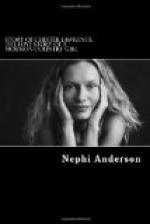So these two rode and rambled about Paris for nearly a week, sometimes with the father, sometimes with Uncle Gilbert, but more often by themselves. The days were fine. The parks and boulevards were gay with people. They made purchases in the shops along Rue de Rivoli and at the Bon Marche, the great department store which Lucy declared they could equal in Kansas City. They gazed for hours in the Louvre Art Gallery, coming back time and again to look once more at some picture. The Venus de Milo had a fascination about it which drew them into the long gallery, where at the extreme end, the classic marble figure stands alone.
They rode on the Seine, wondering at its clear waters. They walked about the open squares and gardens all of them of historic significance. They promenaded, very quietly, it is true, along the Champs Elysees. They lingered about the Petit Palais, one of the most beautiful of Paris buildings because of its newness, its clean, chaste finish, and the artistic combination of marble, pictures, and flowers. Was it any wonder that amid all this interesting beauty Chester’s and Lucy’s eyes and hands frequently met to express what words failed to do?
The four sight-seers were at Napoleon’s Tomb, admiring the wonderful light effect.
“Every time I visit this place,” said Uncle Gilbert, “I like to read a summary of Napoleon’s career which I found and clipped. Would you like to hear it?”
The others said they would, so Uncle Gilbert read:
“Egyptian sands and Russian snows alike invaded; a revolution quelled, an empire created; his own brethren seated on thrones of vassal kingdoms; a complete code of jurisprudence formed for France from the wrecks of mediaeval misrule; the most profound strategist of the ages; denounced by nations as the ‘disturber of the peace of the world;’ violating the marriage law of God and man; himself a dwarf in height, and lowering the physical stature of a generation of his countrymen through the frightful carnage of wars undertaken largely for his personal aggrandizement; succumbing in the moment of final victory to insidious disease; twice expatriated, dying in exile across the seas, after twenty years; in life, the idol of a race and the detestation of the rest of the continent; and now, a handful of dust, his spirit in the presence of its Maker.’”
This reading furnished a text for the minister, who talked rather more freely than he had recently done. Notre Dame lay in their route that afternoon, so naturally enough, they went in, Uncle Gilbert remarking that this was a fit place for the minister to conclude his sermon.
“What a dark, musty place,” said Lucy.
“It fits in very well with their religion,” suggested Chester. “A lot of outward show, but within, dark and dead.”
Uncle Gilbert, though living in Ireland, was not a Catholic, so he took no offense at this remark.
Then while they were “doing” churches, they visited that of St. Sulpice, a very large edifice, in the floor of which is a brass line which marks the Meridian of Paris. At the left of the entrance sits St. Peter in life-sized bronze, in possession of the Keys. The naked big toe of this figure is easily reached by the worshipers.




